Key takeaways:
- Listening to the experiences of individuals affected by homelessness fosters empathy and informs effective solutions.
- Engagement with community voices builds trust and empowers those affected to contribute to discussions and strategies.
- Creating inclusive environments and utilizing creative outlets can amplify the voices of marginalized individuals.
- Maintaining genuine communication with stakeholders helps uncover insights that lead to meaningful partnerships and improved services.
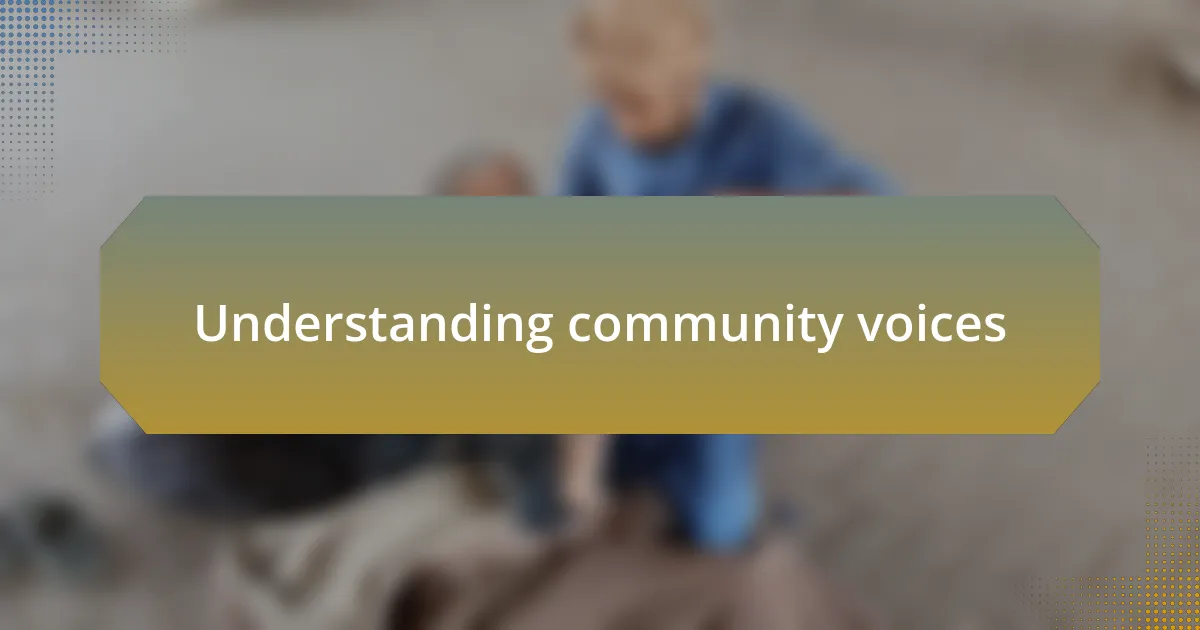
Understanding community voices
Understanding community voices is vital in the fight against homelessness. When I volunteered at a local shelter, I often found that the stories of those affected by homelessness were rich with emotion and complexity. Listening to their experiences offered me profound insights into the diverse challenges they face, such as mental health issues and systemic barriers.
When we talk about community voices, we must consider the importance of truly hearing them. How often do we pass judgment without knowing the full story? I remember speaking with a mother who had lost her job and her home within weeks. Her voice, filled with despair yet also resilience, highlighted that each person’s journey is uniquely intertwined with broader social issues.
Engaging these voices not only fosters empathy but also drives effective solutions. In my experience, inviting homeless individuals to share their perspectives during community meetings brought to light practical suggestions that professionals often overlook. How can we manage to solve a problem without understanding the people living it? This kind of dialogue can illuminate paths to real change, guiding us toward a more compassionate approach.
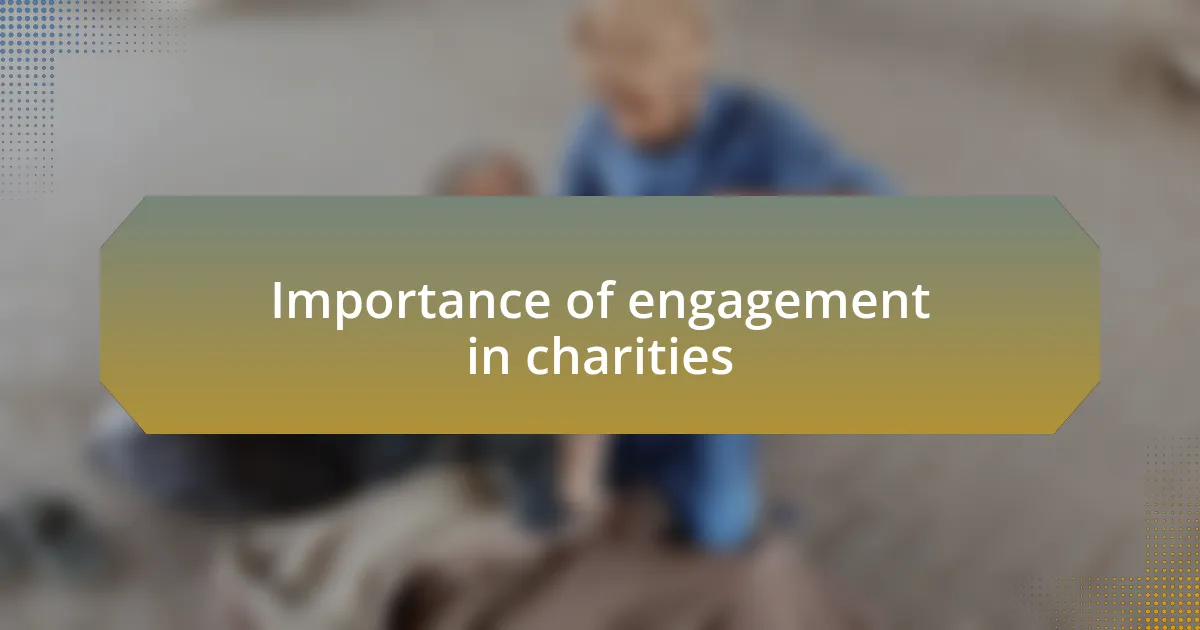
Importance of engagement in charities
Engagement in charities, particularly those focused on homelessness, serves as a bridge between people in need and the support systems that exist to help them. I once participated in a fundraiser where community members could voice their thoughts on local services. Listening to someone share how a simple change in hours for a shelter could drastically improve access for many gave me a clear picture of the needs that often go unaddressed. Why are we not prioritizing these insights?
When charities engage deeply with community voices, it builds trust and creates a sense of ownership among those affected. I remember attending a roundtable discussion where a formerly homeless person spoke about their journey to finding stable housing. Their candid account resonated with everyone in the room, prompting us all to rethink our strategies and connect on a more human level. Are we truly ready to be influenced by the very people we aim to assist?
Moreover, engagement enriches the narrative around homelessness. It transforms statistics into stories, humanizing the experience and breaking down the preconceived notions many people hold. In my capacity as a volunteer, I’ve seen how incorporating feedback from the individuals we serve leads to innovative solutions and comprehensive care that addresses real needs. Isn’t it time we let these voices lead us toward change?
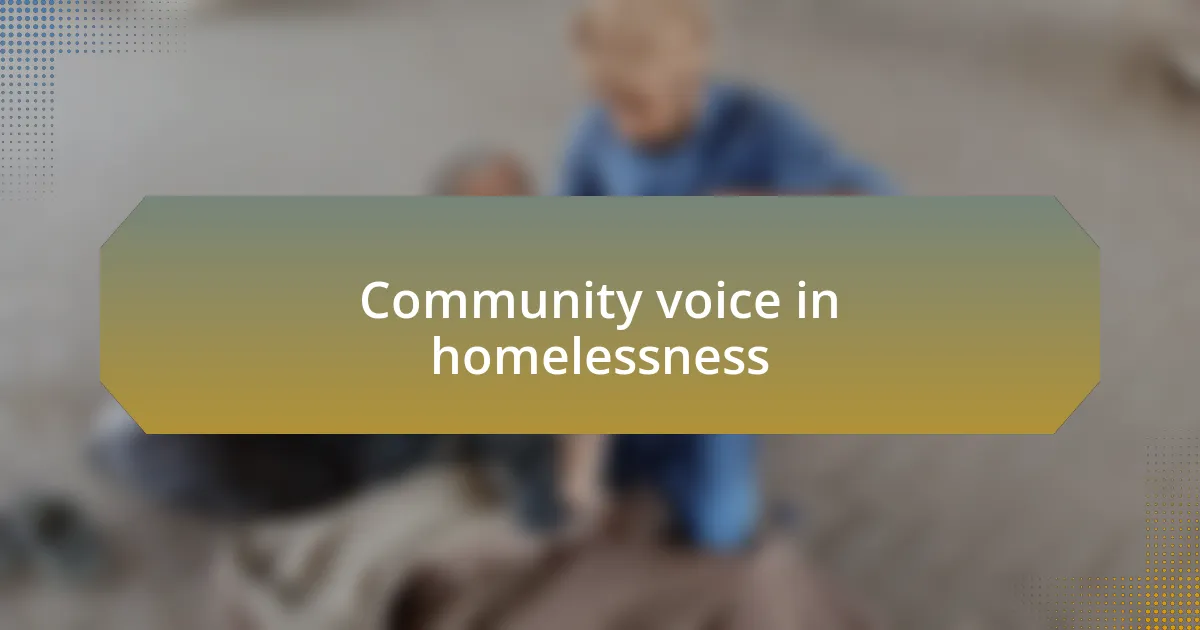
Community voice in homelessness
Community voices in homelessness are invaluable in shaping the responses we have to this issue. I recall a local meeting I attended where community members shared their experiences with homelessness support services. One woman described how a lack of transportation options severely limited her ability to access job training, highlighting a gap we, as a community, had all overlooked. It made me wonder about the untapped wisdom within those who have lived through these challenges.
Listening to these voices can also uncover the cultural nuances that impact how individuals experience homelessness. During a project, I had the opportunity to work with a diverse group of individuals, and I was struck by how their backgrounds influenced their struggles and needs. One participant shared how cultural stigma prevented them from seeking help, a reminder that we often need to adapt our approach to meet various community needs. Are we truly listening, or are we just hearing?
Moreover, fostering an environment where community voices can thrive is crucial for long-term success. I once helped facilitate a workshop where participants proposed new initiatives based on their own insights. It was inspiring to see how their energy transformed into actionable plans. This experience left me questioning, how can we continue to empower these voices to not only share their stories but to lead the charge toward solving homelessness?
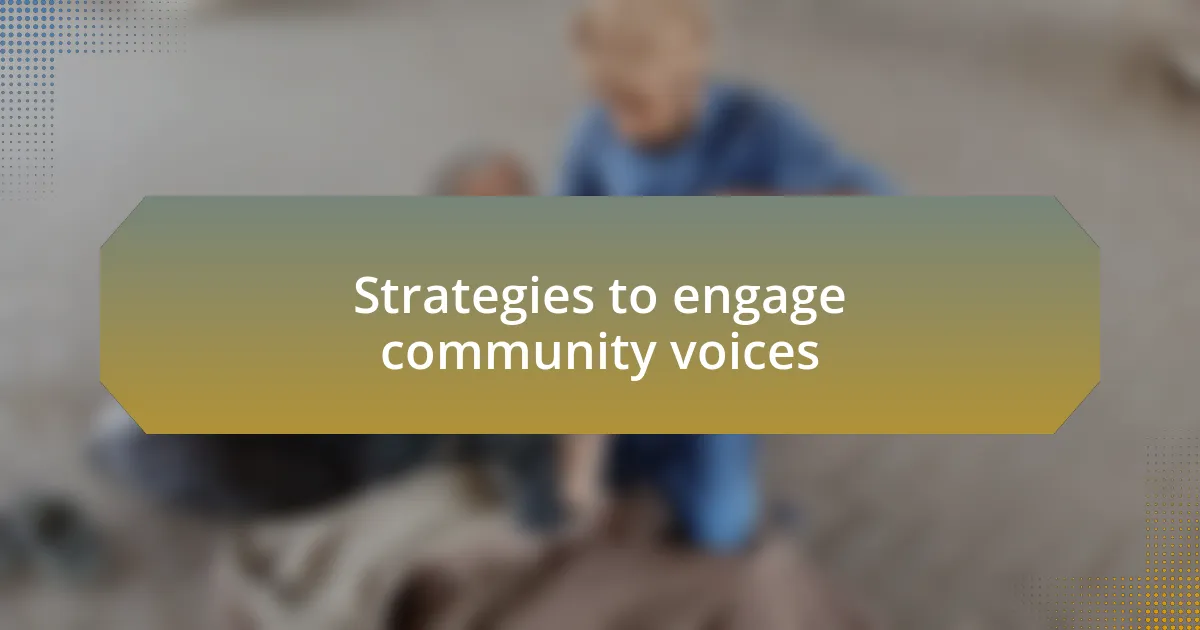
Strategies to engage community voices
One effective strategy to engage community voices is to create regular forums where individuals can share their stories and insights openly. I remember attending a neighborhood potluck where we set aside time for storytelling. The atmosphere was warm and inviting; it felt like we were not only breaking bread together but also breaking down barriers. How can we replicate such inclusive environments that encourage vulnerability and honesty?
Another important approach is partnering with local organizations that already have established relationships within the community. I had the privilege of collaborating with a group focused on youth services, which helped us reach young people who usually felt unheard. They opened doors for discussions that would have otherwise remained closed. This made me realize, aren’t we often missing out on vital perspectives simply because we don’t know how to access them?
Additionally, using creative outlets can be transformative in amplifying community voices. I facilitated an art project where individuals illustrated their experiences and feelings about homelessness. The pieces were powerful and eye-opening, evoking emotions that often go unspoken. It left me wondering, how often do we overlook the power of visual expression in conveying complex narratives?
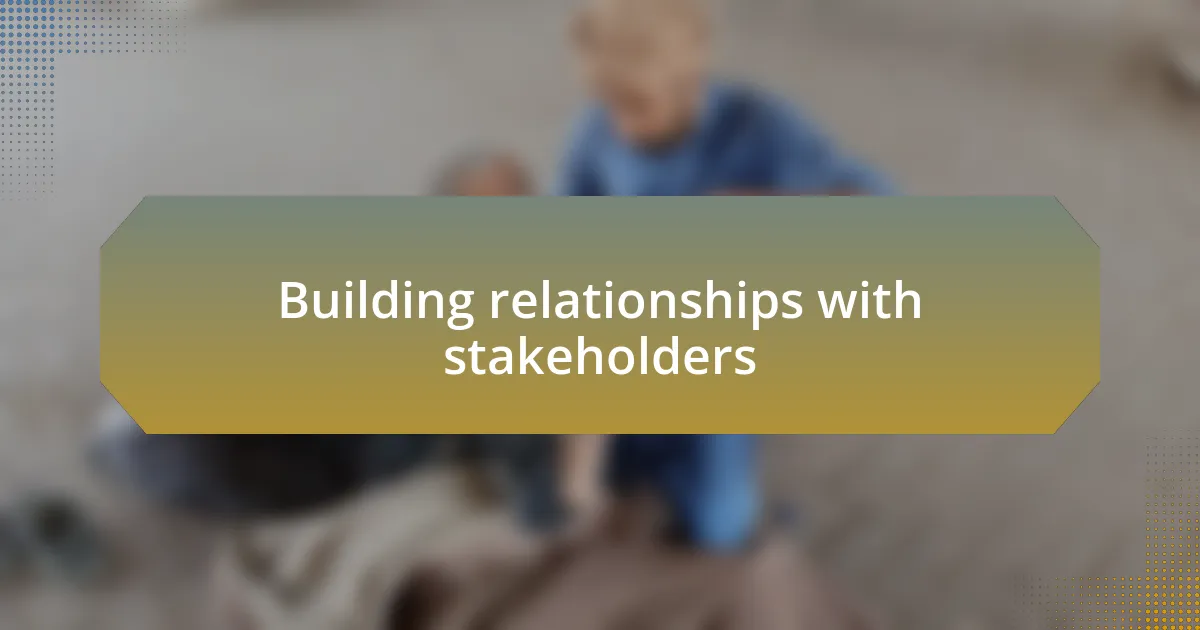
Building relationships with stakeholders
Building relationships with stakeholders requires intentionality and genuine communication. I recall a time when I sat down with a local business owner who had expressed concerns about homelessness in our area. By listening deeply to his perspective, we not only addressed his worries but also forged a partnership that led to job opportunities for individuals experiencing homelessness. How often do we overlook the potential of these conversations to create real change?
It’s crucial to cultivate trust with various stakeholders, including individuals who have lived experience with homelessness. I once helped organize a series of joint workshops between our charity and a group of former residents of shelters. Hearing their insights firsthand revealed gaps in our services that we hadn’t even considered. Isn’t it fascinating how those who have navigated the system can provide us with insights that data alone cannot?
Moreover, maintaining consistent follow-up is key to fostering these relationships over time. After a planning meeting I attended, I made it a point to send a simple thank-you message to all participants. This small gesture reinforced our commitment to collaboration. How often do we underestimate the power of acknowledgment in nurturing long-term connections?
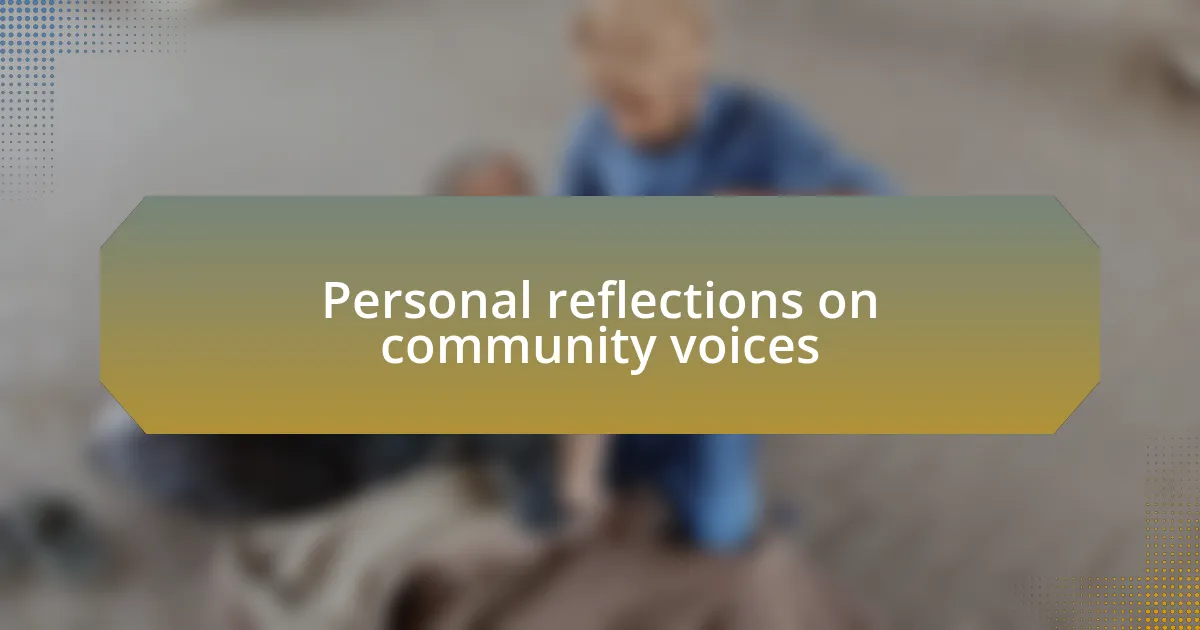
Personal reflections on community voices
Engaging community voices goes beyond mere conversations; it’s about creating a space where everyone feels heard. I vividly remember attending a community forum where someone experiencing homelessness shared their journey. It struck me how their story illuminated the complexities of their situation—details that statistics, no matter how compelling, could never fully capture. Have you ever listened to a voice that changed your perspective entirely?
In my experience, the most transformative moments arise when we acknowledge the lived realities of those we aim to support. During a local outreach event, I struck up a conversation with a woman who had recently secured housing. Her joy was palpable, but so was her frustration regarding the myths surrounding homelessness. I found myself reflecting on the power of narrative; how each personal story could challenge misconceptions and foster empathy. Isn’t it amazing how one conversation can spark a broader understanding within our community?
I often think about the richness of diverse perspectives and how they push us to think critically about our programs. Once, while collaborating with a community group, a participant suggested simple changes to our service model, based on their experiences. Their input didn’t just improve our approach; it fostered a genuine sense of ownership among everyone involved. How wonderful would it be if more organizations prioritized these valuable insights from the community?
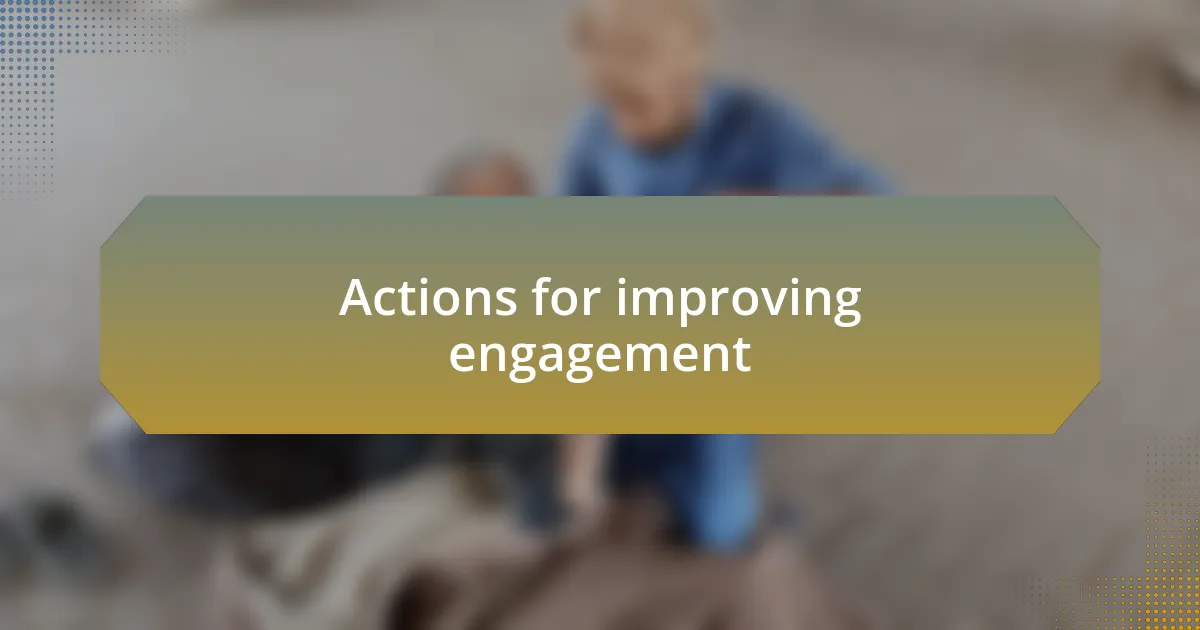
Actions for improving engagement
To enhance engagement with community voices, organizations should prioritize creating accessible opportunities for participation. I recall organizing a workshop where individuals were encouraged to share their experiences freely. The atmosphere shifted from being somewhat formal to deeply personal, allowing authentic connections to flourish. Have you ever noticed how a relaxed setting can invite more honest conversations?
Another effective action is to leverage technology for outreach and feedback. I once facilitated an online survey designed for individuals experiencing homelessness, and the response was overwhelming. It was a simple tool, yet it opened a floodgate of insights that we had previously overlooked. How can we harness such platforms to ensure every voice is included in our mission?
Lastly, providing training for staff on active listening can dramatically improve relationships with the community. I remember a colleague who transformed our approach by learning to reflect back what participants shared, validating their feelings and experiences. Doesn’t it make you think about how deeply we can impact someone’s journey by simply listening more intently?